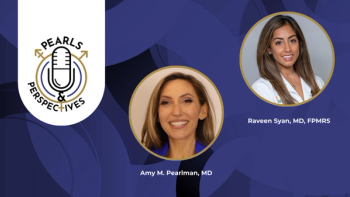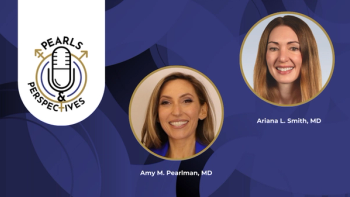
Minimally-Invasive Therapeutic Advancements in OAB Management
In this episode, Dr. Kennelly, alongside Dr. Eilber and Dr. Benson, explores the advancements of transcutaneous and posterior tibial nerve stimulation (TTNS and PTNS) and sacral neuromodulation (SNM). The episode sheds light on how these therapies fit into current medical practices, their effectiveness, and the convenience they offer to patients. The specialists consider patient preferences and compliance challenges in choosing the right therapy. The episode provides a comprehensive understanding of how these therapies fit into patient-centric management plans, offering valuable insights for both patients and healthcare professionals.
Episodes in this series

Transcript:
Dr Kennelly: Dr. Eilber, from the different neuromodulation devices, I guess it originally started with sacrum neuromodulation, which is a surgical procedure implant, then we went to the opposite of posterior tibial stimulation, which is an office -based therapy on a peripheral nerve, or, and there's some newer sort of FDA-approved devices now for transcutaneous tibial stimulation. nerve stimulation or sort of implantable tibial stimulation. How do you see these fitting in within the practice of yours today?
Dr. Eilber: You know, it's interesting. First of all, I think we should always use a term either a neuromodulation or a neuroregulation. Because when we say nerve stimulation, it almost seems like we're stimulating the bladder, which is the opposite. Like people don't want their symptoms to change. stimulated. So I try to avoid that because I see people looking at me a little confused sometimes and you say like tibial nerve stimulation. It's interesting, you would think that everyone would choose what would probably by most people be considered less invasive doing tibial nerve stimulation. And we actually looked at our patient population because you would think that tibial nerve stimulation could maybe be like an introduction to sacral nerve stimulation. right? Maybe they'd be a little more receptive to an implant if they kind of knew how it worked. But in fact, it didn't change. I think that there are people who are okay doing tibial nerve stimulation. There are people who just want the implant for the one and done type of thing. So, you know, I do both. I've been very pleasantly surprised over the years how well tibial nerve stimulation works.
I'm not using any other implantable devices except for a study that I've currently involved in for an implantable one. But I do think it is whether it's implantable tibial nerve, neuromodulation, not stimulation, or sacral nerve. I think these are great options for people because it is, I didn't think about that way, but Dr. Benson, you're absolutely right. When you have something that's kind of treated for, you know, many, many years, it's different than having to take a pill every day, which reminds you, oh, yeah. I'm kind of, I've got another chronic medical condition, I'm just taking medication for every day.
Dr Kennelly: Yeah, I think in my practice, when I'm kind of looking at these different aspects, there is a time commitment for posterior tibial nerve stimulation. You know, you've got to come on a weekly basis into the office. So kind of patients self-select themselves if they have the time commitment, the energy, because there's no reason to start something, and be able to start something.
I know Dr. Benson, you have many people that travel long distances to see you. I can't imagine that posterior tibial nerve stimulation is really can be successfully done when people are traveling such long distance. What's your experience? -
Dr Benson: For sure.I think that even for people who don't travel long distances, there's just a lot of fatigue involved. I think that the other thing is, if you're not compliant with going through the course of care, you have to essentially step back and restart. Insurance consideration over time is also an issue. So we just haven't found that to be a very effective long -term option for our patients. We have a few that it fits their demographic and they like it. It's certainly very safe and easy to do, but it also ties up your office for a period of time while you're doing it. And I think that now with the implantable to stimulators, maybe we've bridged that, that shortcoming of it. And again, you know, having worked with those, I think that there's a lot of promise that we may be able to provide a form of that stimulation is more palatable to patients. And, you know, I have patients who literally might live a block away, and they're not more thrilled about coming in than people who have to travel because, you know, they have to be in each week and the compliance becomes a big issue.
Dr Kennelly: Right, I think now we do have two new FDA approved implants, which would be E -Coin and also Revi. And with that, it could avoid the aspects of having to keep coming back all the time. But mechanistically, it's still a stimulate in the same area and the results at least from the phase three trials have actually been very impressive on both of those therapies. So I would advise you to do that. Dr. Benson, your practice, that may be a good option for patients.
Dr. Benson: Well, I think for all practices, it's going to be a good option. Having worked with these products, again, I think that they're certainly going to be a major part of what we do and anything that we can do that's less invasive, it has good durability, that's easy for patients, it's going to be part of it. So I thank that for everyone. everybody listening to this and watching today, there's a lot more to come. And I think it's going to become an integrated part of our practice.
*Video transcript is AI-generated and reviewed by Urology Times® editorial staff.
Newsletter
Stay current with the latest urology news and practice-changing insights — sign up now for the essential updates every urologist needs.






